By Sara Amundson and Kitty Block
Some of the people and interests tied to cruelty to animals seem to come right from central casting. That’s going to help us succeed in our efforts to secure passage of the Safeguard American Food Exports (SAFE) Act, H.R. 961/S. 2006, to permanently ban domestic horse slaughter and end the export of American horses for slaughter abroad.
It’s just come to light that a USDA Administrative Law Judge not long ago served up a bit of justice to two kill buyers, the owners of Stanley Bros Farm, fining the company $4000 for multiple violations of the federal government’s Commercial Transport of Equines to Slaughter regulations. This is the latest fine imposed on the Louisiana-based company which operates a kill pen and ships horses to Mexico for slaughter, and it was imposed in the aftermath of an investigation by the group Animals’ Angels.
Every year, kill buyers like the Stanley Brothers funnel tens of thousands of American horses—working, racing, and companion horses, and even children’s ponies—into the international horse meat trade, going from auction to auction and gathering up young and healthy horses, often misrepresenting their intentions, to send them to slaughter for human consumption overseas. The Stanleys were found to have used forged health certificates, obscured the origin of the horses they shipped to Mexico for slaughter, failed to produce the necessary owner/shipper certificates, and neglected to provide time and location reports concerning the loading of the horses.
It is just these kinds of violations that led the European Union to place a moratorium on horsemeat imports from Mexico, in part to protect EU consumers from ingesting toxic drugs that such horses may have routinely consumed during their lives. Walk into any horse stable in the country, and you’ll find at least one product labeled “not intended for use on animals destined for human consumption.” Researchers with the Universidad Nacional Autonoma de Mexico found horsemeat present in raw and cooked samples sold as beef or poorly labeled in butcher shops, markets and informal selling locations such as street stalls in six Mexican cities. Their study also found high levels of clenbuterol, a veterinary drug not approved for use in animals in the food supply, in some raw meat samples.
And it’s just these kinds of violations that make a final and lasting prohibition of the slaughter of American horses for human consumption in the United States and abroad both necessary and urgent. There’s no way to resolve the many problems caused by fraudulent practices in the industry, without a final and full stop ban on a practice that is abhorrent to countless Americans. In truth, there’s no way to make the trade less cruel at all, for the slaughter of horses cannot be done humanely given their pronounced flight response and anatomy.
Thankfully, we’ve seen recent progress in the fight to end horse slaughter, as there was an encouraging hearing on the SAFE Act in the House Energy and Commerce Committee’s Health Subcommittee at the end of January. Over half the members of the U.S. House of Representatives are now cosponsors, and the Senate bill, introduced by U.S. Sens. Bob Menendez (D-N.J.) and Lindsey Graham (R-S.C.) also has bipartisan support.
It’s often forgotten that kill buyers are out there outbidding rescue groups and families who could offer many of these horses loving and permanent homes. Just last fall, a six year old quarter horse saved from a kill pen and his 13 year old owner placed among the top twenty contestants in the single largest breed show in the world. This was so heartening to us.
We’ve said it for a long time: horse slaughter is a grim and ugly business, and it’s beneath the status of a great nation to let it carry on in light of all we’ve seen and all that Americans believe. We don’t eat horses, and more than 80 percent of Americans don’t approve of their being hauled over long distances to Canada or Mexico, to be inhumanely killed for an overseas market in their flesh.
The Stanleys aren’t the only bad faith actors in the horsemeat trade; they’re simply the ones in the news cycle today. But their way of doing business says all that we need to know about the transport and killing of horses for foreign meat exports. It’s cruel to the horses, it’s potentially unsafe for consumers, and it’s a waste of U.S. taxpayer dollars. It’s time to put a stop to the slaughter of American horses for human consumption and pass the SAFE Act.
Please take a moment to contact your federal legislators and urge them to cosponsor the SAFE Act if they haven’t yet, and do all they can to get it passed!
Kitty Block is President and CEO of the Humane Society of the United States.




